Project Jukebox Survey
Help us redesign the Project Jukebox website by taking a very short survey!
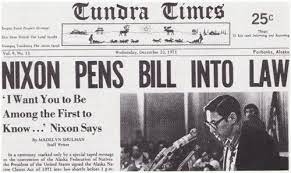 Honoring the Founders: Alaska Native Claims Settlement Act Project Jukebox was created in recognition of the 50th anniversary of the signing of the Alaska Native Claims Settlement Act (ANCSA) on December 18, 1971. This landmark legislation transferred 44 million acres of land from the federal government to newly formed Alaska Native regional and village corporations, and provided $962.5 million in compensation for lost land. It was the largest settlement of Native land claims in American history and transformed the social, political and economic landscape of Alaska, including with the influence of Native regional corporations, improvements to life in rural villages, management of land and subsistence, tribal sovereignty, and development of Native leadership. Not everyone supported ANCSA; it extinguished Aboriginal title to the land and Aboriginal hunting and fishing rights, thereby restricting Native control over land and subsistence.
Honoring the Founders: Alaska Native Claims Settlement Act Project Jukebox was created in recognition of the 50th anniversary of the signing of the Alaska Native Claims Settlement Act (ANCSA) on December 18, 1971. This landmark legislation transferred 44 million acres of land from the federal government to newly formed Alaska Native regional and village corporations, and provided $962.5 million in compensation for lost land. It was the largest settlement of Native land claims in American history and transformed the social, political and economic landscape of Alaska, including with the influence of Native regional corporations, improvements to life in rural villages, management of land and subsistence, tribal sovereignty, and development of Native leadership. Not everyone supported ANCSA; it extinguished Aboriginal title to the land and Aboriginal hunting and fishing rights, thereby restricting Native control over land and subsistence.
The Alaska Native Claims Settlement Act Project Jukebox emphasizes the recollections of people who are important to the Native land claims movement, and is an opportunity to recognize those who worked to bring about this settlement, to assess the legislation that was created, and to evaluate impacts fifty years later. The story of ANCSA has been written in many published works, however, hearing from the people in their own words about their struggles, their successes, and what actually happened offers a richer and more personal experience. By listening to these first-hand accounts, students of land claims can better understand what their leaders went through to build a better world.
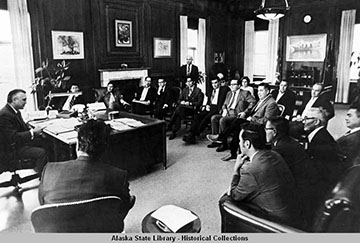 In 2022, the Alaska Historical Society produced the "Guide to Sources for the Study of the Alaska Native Claims Settlement Act" that contains information about primary source archival resources on ANCSA available from archives around the state and nationally (Volume 1 includes an essay on the history of ANCSA, a timeline, a list of key participants in the land claims movement, and an inventory of major collections; Volume 2 is an annotated bibliography of published and unpublished sources of information about the act; and Volume 3 presents educational resources for the teaching of ANCSA). The guide includes descriptions of manuscript and photograph collections, oral histories, historic film, media productions, and online materials.
In 2022, the Alaska Historical Society produced the "Guide to Sources for the Study of the Alaska Native Claims Settlement Act" that contains information about primary source archival resources on ANCSA available from archives around the state and nationally (Volume 1 includes an essay on the history of ANCSA, a timeline, a list of key participants in the land claims movement, and an inventory of major collections; Volume 2 is an annotated bibliography of published and unpublished sources of information about the act; and Volume 3 presents educational resources for the teaching of ANCSA). The guide includes descriptions of manuscript and photograph collections, oral histories, historic film, media productions, and online materials.
The Alaska Native Claims Settlement Act Project Jukebox was created in 2022 by Karen Brewster of the Oral History Program at the University of Alaska Fairbanks. Funding was provided by the Alaska State Library through an Interlibrary Cooperation Grant based on American Rescue Plan Act (ARPA) funds. The information in this project reflects the context of the original creation date. Some information may become out of date.
*Native leaders in this photograph from left to right are: Tim Wallis, President Fairbanks Native Association; Charles Edwardsen, Jr., Executive Director Arctic Slope Native Association; Eben Hopson; Emil Notti; Attorney Barry Jackson (standing); State Senator William Hensley; and Alfred Ketzler. Farthest back on the right are State Senator Ray Christiansen and Frank Degnan. John Borbridge is seated in the foreground.
People
 |
Margaret "Margie" Brown |
Margaret "Margie" Brown was born in 1949 to Berntina and Ben Twitchell in Anchorage, Alaska. She grew up in Takotna, Alaska until she was seven years old when the family moved to Oregon. After earning a bachelor's degree in wildlife biology from the University of Oregon, Margie returned to Alaska in 1974 looking for work. Unable to find employment in her chosen field, she ended up working in the lands department of the newly formed Calista Native Corporation. In 1976, she got a job with Cook... Read More |
 |
Delois Burggraf |
Delois Burggraf was born in 1938 to Dorothea and Charlie Purvis in Kansas City and spent her early years living on a farm in Missouri. The family moved to Nenana, Alaska in 1951 and she quickly took to the small community and rural subsistence lifestyle. She loved the woods, and learned to run a dog team, hunt and trap, and ran a snare line near the house to catch rabbits for dinner. Her father was a big supporter of equality for Natives and became close friends with many of the local... Read More |
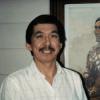 |
Walter "Wally" Carlo |
Wally Carlo is an Athabascan who was born in 1946 to Poldine and William Carlo in Tanana, Alaska, and grew up in Ruby, Galena, and Fairbanks. Despite living in the city and getting an education in business, Wally grew up living a traditional subsistence lifestyle based upon hunting, trapping and fishing. He learned how to travel and survive in the wilds of interior Alaska and to be a keen observer of the world around him. In fact, between 1969 and 1980, Wally lived in Tanana and hunted,... Read More |
 |
Sam Demientieff |
Sam Demientieff is an Athabascan who was born in Holy Cross, Alaska in 1939, and grew up in Nenana and Fairbanks, and along the Yukon and Tanana Rivers where his father ran a barge service. He graduated from high school at Copper Valley School in Glennallen, and earned a certificate in mineral petroleum technology from the University of Alaska Fairbanks. Sam worked for Fairbanks Native Association, Doyon, Ltd. and retired from the Bureau of Indian Affairs. Sam has extensive knowledge of... Read More |
 |
Barry Jackson |
Barry Jackson was an attorney in Fairbanks, Alaska who is most known for representing Alaska Natives during negotiations with Congress over the Alaska Native Claims Settlement Act during the late 1960s and 1970s. He was born in 1930, was a retired Marine Corps Major, and earned a bachelors degree in political science in 1952 and a law degree in 1958 both from Stanford University in Palo Alto, California. He visited Alaska in 1957, while still in law school, and ended up making it his... Read More |
 |
Alfred "Bear" Ketzler, Jr. |
Alfred "Bear" Ketzler, Jr. was born in 1956 and is the oldest of six children of Delois (Burggraf) and Alfred "Al" Ketzler, Sr. He grew up in Nenana and Fairbanks, Alaska during the 1950s and 1960s when his parents were deeply immersed in the struggle for Alaska Native land claims and passage of the 1971 Alaska Native Claims Settlement Act (ANCSA). He remembers his mother taking her children to meetings, the many visitors who passed through their home and the conversations about Native... Read More |
 |
James "Jim" Kowalsky |
James “Jim” Kowalsky came to Alaska around 1970 when he helped his friend Gordon Wright move to Fairbanks for a teaching job at the University of Alaska. Jim earned a bachelors and masters degree from the University of Wisconsin in Madison and began his career teaching music in public schools and colleges, and played the trumpet in symphony orchestra performances. He had a strong love of nature, the outdoors and interest in conservation, so he was soon involved in Alaska’s burgeoning... Read More |
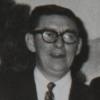 |
Roger Lang |
Roger Lang was born in 1929 in Metlakatla, Alaska on the Annette Island Indian Reservation. He grew up there and in Sitka, Alaska where he graduated from Sheldon Jackson School, and enjoyed playing basketball. In 1947, he began work as a federal employee for the Bureau of Indian Affairs, the Public Health Service, and the Forest Service. In 1969, he resigned from federal employment to become more active in Alaska Native affairs, and became a leader in the Alaska Native land claims movement... Read More |
 |
Mary Nordale |
Attorney Mary Nordale was born in 1934 to Katherine and Alton Nordale in Fairbanks, Alaska. She has deep family ties to Fairbanks. Her grandfather, Anton Nordale, built the Nordale Hotel; her father served in the Alaska Legislature; and her mother was clerk of the court in Fairbanks. Mary earned a bachelor's degree from Gonzaga University in 1957 and in 1960 became a staff member in the Washington, D.C. office of Alaska's Senator E. L. "Bob" Bartlett. This gave her a front row seat to the... Read More |
 |
Emil Notti |
Emil Notti is Koyukon Athabascan from Koyukuk, Alaska. Born in 1933, he grew up living a traditional subsistence lifestyle, but was sent to boarding school for high school since there was no high school in his village. He graduated from Mount Edgecumbe High School in Sitka, Alaska, earned a Bachelors of Science degree in aeronautical and electrical engineering from Northrop Institute of Technology (now Northrop University) in Inglewood, California, and served in the U.S. Navy during the... Read More |
 |
Colleen Redman |
Originally from Virginia, Colleen Redman first came to Alaska in 1956 and 1957 for a summer job at the Mount McKinley Park Hotel in what is now Denali National Park. After completing, her bachelor's degree at Berea College in Berea, Kentucky, she married and moved to Fairbanks in 1958. She went on to earn a master's degree in social work in 1963. From 1967 to 1973, she coordinated the State of Alaska's boarding home program for rural high school students, started the Community Action... Read More |
 |
Irene Rowan |
Irene Sparks Rowan is Tlingit from the village of Klukwan, Alaska. She was born in 1941, and grew up in Klukwan and the nearby community of Haines, Alaska. She earned a teaching degree at Minot State Teachers College in Minot, North Dakota and taught in Bethel, Alaska for three years. She went on to work for the Alaska Federation of Natives, run a public opinion firm in Anchorage, establish her own public affairs company, Kish Tu, Inc., with Susan Ruddy, and was president and then chairman... Read More |
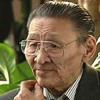 |
Joseph "Joe" Upicksoun |
Joseph "Joe" Upicksoun was Iñupiaq and born near the current village of Point Lay, Alaska in 1931. He grew up living a traditional subsistence lifestyle of hunting, fishing, whaling and traveling on the land, sea and ice. He served in the Merchant Marines during the Korean War, and worked for Federal Electric Corporation on the DEW Line (Distant Early Warning Line). Joe became a powerful voice in the Alaska Native land claims movement in the 1960s and 1970s. As president of the Arctic Slope... Read More |


